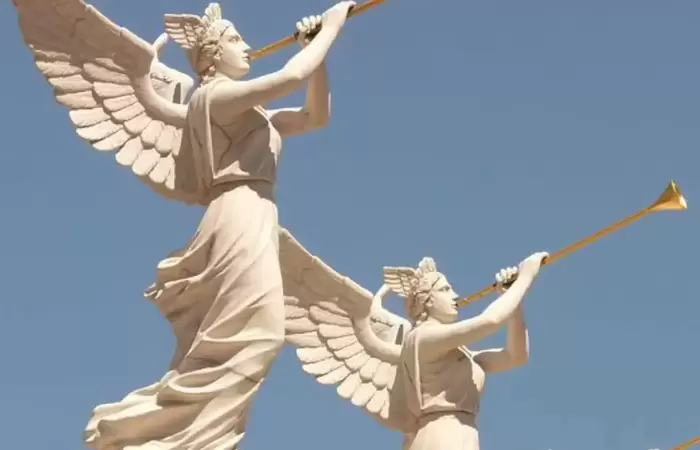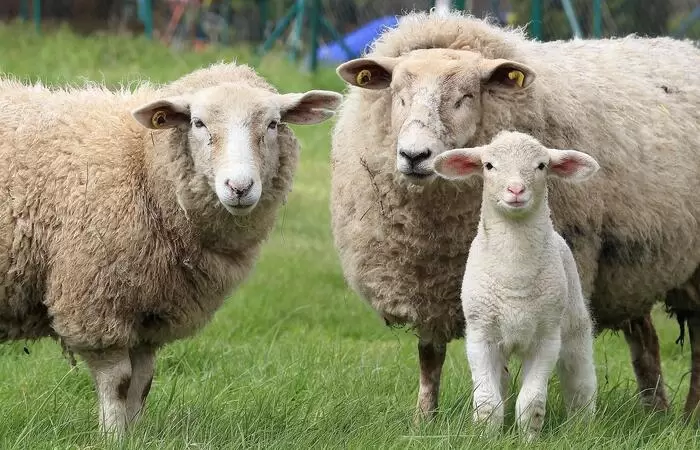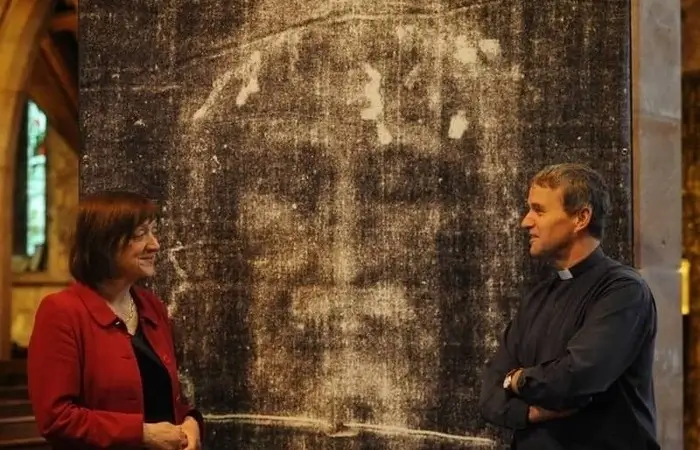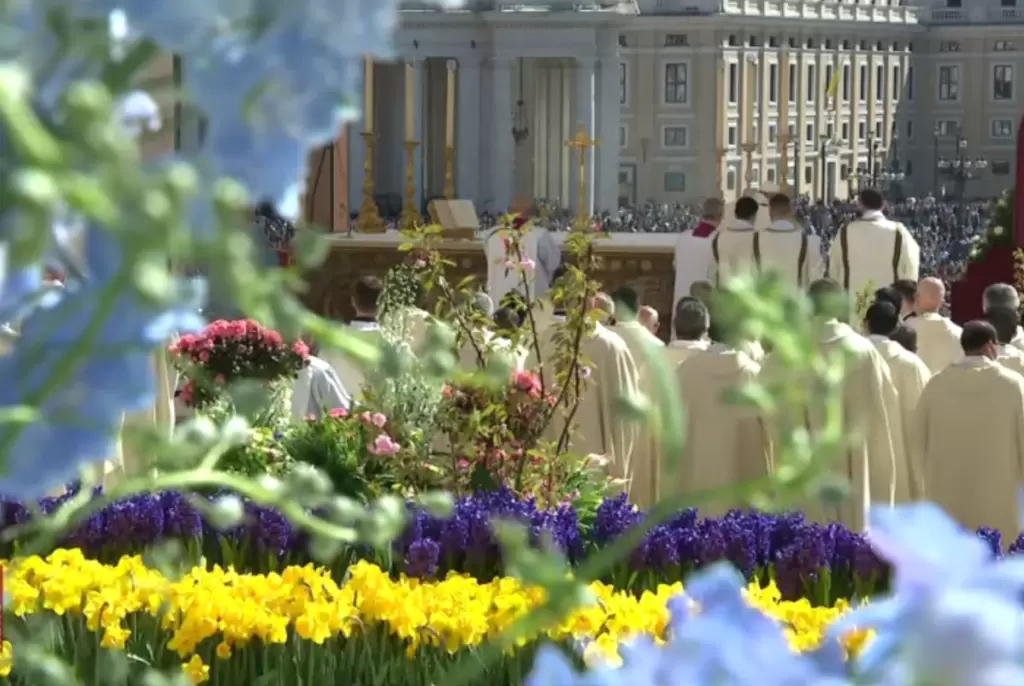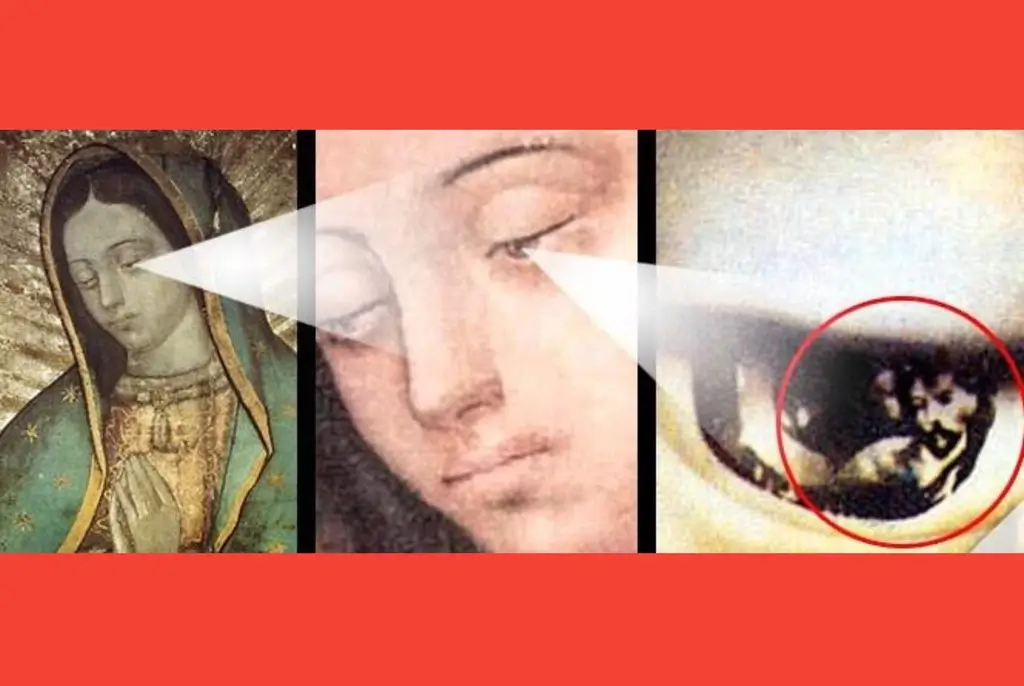St. Bonaventure reminds us of the life of St. Francis of Assisi
That true godliness which, according unto the Apostle, is profitable unto all things, had so filled the heart of Francis and entered into his inmost parts as that it seemed to have established its sway absolutely over the man of God. It was this piety that, through devotion, uplifted him toward God; through compassion, transformed him into the likeness of Christ; through condescension, inclined him unto his neighbour, and, through his all-embracing love for every creature, set forth a new picture of man’s estate before the Fall.
And as by this piety he was touched with kindly feeling for all things, so above all, when he beheld souls redeemed by the precious Blood of Christ Jesus being defiled by any stain of sin, he would weep over them with such tenderness of compassion as that he seemed, like a mother in Christ, to be in travail of them daily. And this was with him the chief cause of his veneration for the ministers of the word of God, to wit, that with devout care they raise up seed unto the Brother which is dead, that is, unto Christ crucified for sinners, by converting such, and cherish the same seed with careful devotion. This ministry of compassion he maintained was more acceptable unto the Father of mercies than all sacrifice, in especial if it were performed with the zeal of perfect charity, so that this end might be striven after by ensample rather than by precept, by tearful prayer rather than by eloquent speech.
answer from the Lord
But when once on a time he was disquieted because of evil ensamples, and with troubled spirit was beseeching the merciful Father for his sons, he obtained an answer on this wise from the Lord:
“Why do you fret thee, poor little mortal? Have I set thee as shepherd over My Religion that you should forget I am its chief Protector? I have appointed thee, simple as you are, for this very end, that the things that I shall perform through thee may be ascribed, not unto man’s working, but unto grace from above. I have called this Religion, I will keep it and feed it, and, when some fall off, I will raise up others in their place, yea, so that, were none born, I would even cause them to be born. And by whatsoever shocks this little poor Religion may be shaken, it shall alway abide unscathed under My guard.”
On a time when the servant of God was lodging at the Monastery of San Verecondo in the diocese of Gubbio, an ewe gave birth unto a lamb one night. There was hard by a very fierce sow, and she, sparing not the innocent life, slew him with her greedy jaws. When the gentle Father heard thereof, he was moved with wondrous pity, and, remembering that Lamb without spot, mourned over the dead lamb in the presence of all, saying: “Woe is me, brother little lamb, innocent creature, setting forth Christ unto men! Cursed be that evil beast that hath devoured thee, and of her flesh let neither man nor beast eat.’’
Marvellous to relate, the cruel sow forthwith began to languish, and in three days paid the penalty in her own body, and suffered death as her retribution. Her carcase was cast forth into a ditch near the Monastery, and there lay for a long time, dried up like a board, and food for no famished beast.
Let human evil-doing, then, take note by what a punishment it shall be overtaken at the last, if the savageness of a brute beast was smitten by a death so awful: let faithful devotion also consider how in the servant of God was shewn a piety of such marvellous power and abundant sweetness, as that even the nature of brute beasts, after their own fashion, acclaimed it.
While he was journeying nigh the city of Siena, he came on a great flock of sheep in the pastures. And when he had given them gracious greeting, as was his wont, they left their feeding, and all ran toward him, raising their heads, and gazing fixedly on him with their eyes. So eagerly did they acclaim him as that both the shepherds and the Brethren marvelled, beholding around him the lambs, and the rams no less, thus wondrously filled with delight.
At another time, at Saint Mary of the Little Portion, a lamb was brought unto the man of God, the which he thankfully received, by reason of the love of guilelessness and simplicity that the lamb’s nature doth exhibit. The holy man exhorted the lamb that it should be instant in the divine praises, and avoid any occasion of offence unto the Brethren; the lamb, on its part, as though it had observed the piety of the man of God, diligently obeyed his instructions. For when it heard the Brethren chanting in the choir, it too would enter the church, and, unbidden of any, would bend the knee, bleating before the altar of the Virgin Mother of the Lamb, as though it were fain to greet her. Furthermore, at the election of the most holy Body of Christ in the solemn Mass, it would bend its knees and bow, even as though the sheep, in its reverence, would reprove the irreverence of the undevout, and would incite Christ’s devout people to revere the Sacrament.
At one time he had with him in Rome a lamb, by reason of his reverence for that Lamb most gentle, and it he entrusted unto a noble matron, to wit, the lady Jacoba di Settesoli, to be cared for in her bower. This lamb, like one instructed in spiritual things by the Saint, when the lady went into church, kept closely by her side in going and in returning. If in the early morning the lady delayed her rising, the lamb would rise and would butt her with its little horns, and rouse her by its bleatings, admonishing her with gestures and nods to hasten into church. Wherefore the lamb, that had been a pupil of Francis, and was now become a teacher of devotion, was cherished by the lady as a creature marvellous and loveworthy.
At another time, at Greccio, a live leveret was brought unto the man of God, the which,—when set down free on the ground that it might escape whither it would,—at the call of the kindly Father leapt with flying feet into his bosom. He, fondling it in the instinctive tenderness of his heart, seemed to feel for it as a mother, and, bidding it in gentle tones beware of being recaptured, let it go free. But albeit it was set on the ground many times to escape, it did alway return unto the Father’s bosom, as though by some hidden sense it perceived the tenderness of his heart; wherefore at length, by his command, the Brethren carried it away unto a safer and more remote spot.
In like manner, on an island of the lake of Perugia, a rabbit was caught and brought unto the man of God, and, albeit it fled from others, it entrusted itself unto his hands and bosom with the confidence of a tame creature.
As he was hastening by the lake of Rieti unto the hermitage of Greccio, a fisherman out of devotion brought unto him a water-fowl, the which he gladly received, and then, opening his hands, bade it depart; howbeit, it would not leave him. Then he, lifting his eyes unto heaven, remained for a long space in prayer, and, after a long hour returning unto himself as though from afar, gently bade the little bird depart, and praise the Lord. Then, having thus received his blessing and leave, it flew away, shewing joy by the movement of its body.
In like manner, from the same lake there was brought unto him a fine, live fish, which he called, as was his wont, by the name of brother, and put back into the water nigh the boat. Then the fish played in the water nigh the man of God, and, as though drawn by love of him, would in no wise leave the boatside until it had received his blessing and leave.
On another time, when he was walking with a certain Brother through the Venetian marshes, he chanced on a great host of birds that were sitting and singing among the bushes. Seeing them, he said unto his companion: “Our sisters the birds are praising their Creator, let us too go among them and sing unto the Lord praises and the canonical Hours.” When they had gone into their midst, the birds stirred not from the spot, and when, by reason of their twittering, they could not hear each the other in reciting the Hours, the holy man turned unto the birds, saying: “My sisters the birds, cease from singing, while that we render our due praises unto the Lord.” Then the birds forthwith held their peace, and remained silent until, having said his Hours at leisure and rendered his praises, the holy man of God again gave them leave to sing. And, as the man of God gave them leave, they at once took up their song again after their wonted fashion.
At Saint Mary of the Little Portion, hard by the cell of the man of God, a cicada sat on a fig-tree and chirped; and right often by her song she stirred up unto the divine praises the servant of the Lord, who had learnt to marvel at the glorious handiwork of the Creator even as seen in little things. One day he called her, and she, as though divinely taught, lighted upon his hand. When he said unto her: “Sing, my sister cicada, and praise the Lord thy Creator with thy glad lay,” she obeyed forthwith, and began to chirp, nor did she cease until, at the Father’s bidding, she flew back unto her own place. There for eight days she abode, on any day coming at his call, singing, and flying back, according as he bade her. At length the man of God said unto his companions: “Let us now give our sister cicada leave to go, for she hath gladdened us enough with her lay, stirring us up these eight days past unto the praises of God.” And at once, his leave given, she flew away, nor was ever seen there again, as though she dared not in any wise transgress his command.
10. Once while he was lying ill at Siena a fresh-caught pheasant was sent unto him, alive, by a certain nobleman. The bird, so soon as it saw and heard the holy man, pressed nigh him with such friendliness as that it would in no wise brook to be parted from him. For, albeit it was several times set down in a vineyard outside the abode of the Brethren, so that it might escape if it would, it still ran back in haste unto the Father as though it had alway been brought up by his hand. Then, when it was given unto a certain man who was wont out of devotion to visit the servant of God, it seemed as though it grieved to be out of the sight of the gentle Father, and refused all food. At length, it was brought back unto the servant of God, and, so soon as it saw him, testified its delight by its gestures, and ate eagerly.
When he had come unto the solitudes of Alverna, to keep a Lent in honour of the Archangel Michael, birds of divers sort fluttered about his cell and seemed by their tuneful chorus and joyous movements to rejoice at his comings and to invite and entice the holy Father to tarry there. Seeing this, he said unto his companion:
“I perceive, Brother, that it is in accord with the divine will that we should abide here for a space, so greatly do our sisters the little birds seem to take comfort in our presence.”
While, accordingly, he was sojourning in that place, a falcon that had its nest there bound itself by close ties of friendship unto him. For alway at that hour of night wherein the holy man was wont to rise for the divine office, the falcon was beforehand with its song and cries. And this was most acceptable unto the servant of God, the more so as that the great concern which the bird shewed for him shook from him all drowsiness of sloth. But when the servant of Christ was weighed down beyond his wont by infirmity, the falcon would spare him, and would not mark for him so early an awakening. At such times, as though taught of God, he would about dawn strike the bell of his voice with a light touch. Verily, there would seem to have been a divine omen, alike in the gladness of the birds of myriad species, and in the cries of the falcon, inasmuch as that praiser and worshipper of God, upborne on the wings of contemplation, was at that very place and time to be exalted by the vision of the Seraph.
At one time while he was sojourning in the hermitage of Greccio, the natives of that place were plagued by manifold evils. For an herd of ravening wolves was devouring not beasts alone, but men also, and every year a hailstorm laid waste their corn and vineyards. Accordingly, when the herald of the Holy Gospel was preaching unto them under these afflictions, he said:
“I promise you,—pledging the honour and glory of Almighty God,—that all this plague shall depart from you, and that the Lord will look upon you, and multiply your temporal goods if only, believing me, ye will take pity on your own selves, and will first make true confession, then bring forth fruits worthy of repentance. But again, I declare unto you that if, unthankful for His benefits, ye shall turn again unto your vomit, the plague will be renewed, the punishment will be redoubled, and greater wrath will be shewn upon you.”
Then from that very hour, they turned at his admonition unto repentance, and the disasters ceased, the perils passed over, nor was aught of havoc wrought by wolves or hailstorms. Nay more, what is yet more marvellous, if a hailstorm ever fell upon their neighbours’ lands, as it neared their borders it was there stayed, or changed its course unto some other region. The hail observed, yea, and the wolves observed, the pact made with the servant of God, nor did they essay any more to break the law of natural piety by raging against men that had turned unto piety, so long as men in their turn, according unto the agreement, did not act wickedly against the most holy laws of God.
With holy affection, then, must we think on the holiness of this blessed man, that was of such wondrous sweetness and might as that it conquered wild beasts, tamed woodland creatures, and taught tame ones, and inclined the nature of the brutes, that had revolted from fallen man, to obey him. For of a truth it is this piety which, allying all creatures unto itself, is profitable unto all things, having promise of the life that now is, and of that which is to come.
Our Lady’s Teaching to Ven. Mary of Agreda
The divine power and wisdom has no bounds or limits; to his operations only our will, or the limitation of our created nature, offers resistance.
Having seen God in this vision She was immediately shown the works on the sixth day of the creation of the world. She witnessed, as if She Herself had been present, how at the command of the Lord the earth brought forth the living beings according to their kinds, as Moses says (Gen. 1, 24). Holy Scripture here refers to the terrestrial animals, which being more perfect than the fishes and birds in life and activity, are called by a name signifying the more important part of their nature.
She saw and understood all the kinds and species of animals, which were created on this sixth day, and by what name they were called: some, beasts of burden, because they serve and assist man, others, wild beasts, as being more fierce and untamed; others, reptiles, because they do not raise themselves or very little from the earth. She knew and comprehended the qualities of all of them : their fury, their strength, the useful purposes which they serve, and all their distinctions and singularities. Over all these She was invested with dominion and they were commanded to obey Her. She could without opposition on their part have trodden upon asps and basilisks, for all would have meekly borne her heel. Many times did some of these animals show their subjection to her commands, as when, at the birth of her most Holy Son, the ox and the ass prostrated themselves and by their breaths warmed the infant God at the command of his blessed Mother.
God began to exalt and honor poverty and humility among men
For the greater reproach of human ingratitude, it happened also that once during these wintry days they reached a stopping-place in the midst of a cold rain and snow storm (for the Lord did not spare them this in convenience), and they were obliged to take shelter in the stables of the animals, because the owners would not furnish better accommodation. The irrational beasts showed them the courtesy and kindness which was refused by their human fellow-beings; for they retreated in reverence at the entrance of their Maker and of his Mother, who carried Him in her virginal womb. It is true the Queen of creation could command the winds, the frost and the snow not to inconvenience Her; but She would not give such a command in order not to deprive Herself of suffering in imitation of her most holy Son, even before He came forth into the world.
Therefore the inclemencies of the weather affected Her to a certain extent. The faithful saint Joseph, however, did his utmost to shield Her; and still more did the holy angels seek to protect Her, especially the holy prince Michael, who remained at the right side of his Queen without leaving Her even for a moment ; several times, when She became tired, He led Her by the arm along the way. Whenever the Lord permitted, he also shielded Her against the weather and performed many other services for the heavenly Queen and the blessed Fruit of her womb, Jesus.
Thus variously and wonderfully assisted, our travelers arrived at the town of Bethlehem at four o clock of the fifth day, a Saturday. As it was at the time of the winter solstice, the sun was already sinking and the night was falling. They entered the town, and wandered through many streets in search of a lodging-house or inn for staying over night. They knocked at the doors of their acquaintances and nearer family relations ; but they were admitted nowhere and in many places they met with harsh words and insults. The most modest Queen followed her spouse through the crowds of people, while he went from house to house and from door to door. Although She knew that the hearts and the houses of men were to be closed to them, and although to expose her state at her age to the public gaze was more painful to her modesty than their failure to procure a night lodging, She nevertheless wished to obey saint Joseph and suffer this indignity and unmerited shame.
While wandering through the streets they passed the office of the public registry and they inscribed their names and paid the fiscal tribute in order to comply with the edict and not be obliged to return. They continued their search, betaking themselves to other houses. But having already applied at more than fifty different places, they found themselves rejected and sent away from them all.
The heavenly spirits were filled with astonishment at these exalted mysteries of the Most High, which manifested the patience and meekness of his Virgin Mother and the unfeeling hardness of men. At the same time they blessed the Almighty in his works and hidden sacraments, since from that day on He began to exalt and honor poverty and humility among men.
It was nine o clock at night when the most faithful Joseph, full of bitter and heart-rending sorrow,
returned to his most prudent Spouse and said:
My sweetest Lady, my heart is broken with sorrow at the thought of not only not being able to shelter Thee as Thou deservest and as I desire, but in not being able to offer Thee even any kind of protection from the weather, or a place of rest, a thing rarely or never denied to the most poor and despised in the world. No doubt heaven, in thus allowing the hearts of men to be so unmoved as to refuse us a night-lodging, conceals some mystery. I now remember, Lady, that outside the city walls there is a cave, which serves as a shelter for shepherds and their flocks. Let us seek it out ; perhaps it is unoccupied, and we may there expect some assistance from heaven, since we receive none from men on earth.
The most prudent Virgin answered:
My spouse and my master, let not thy kindest heart be afflicted because the ardent wishes which the love of thy Lord excites in thee cannot be fulfilled. Since I bear Him in my womb, let us, I beseech thee, give thanks for having disposed events in this way. The place of which thou speakest shall be most satisfactory to me. Let thy tears of sorrow be turned into tears of joy, and let us lovingly embrace poverty, which is the inestimable and precious treasure of my most holy Son. He came from heaven in order to seek it, let us then afford Him an occasion to practice it in the joy of our souls; certainly I cannot be better delighted than to see thee procure it for me. Let us go gladly wherever the Lord shall guide us.
The holy angels accompanied the heavenly pair, brilliantly lighting up the way, and when they arrived at the city gate they saw that the cave was forsaken and unoccupied. Full of heavenly consolation, they thanked the Lord for this favor.
Most holy Mary and saint Joseph entered the lodging thus provided for them and by the effulgence of the ten thousand angels of their guard they could easily ascertain its poverty and loneliness, which they esteemed as favors and welcomed with tears of consolation and joy. Without delay the two holy travelers fell on their knees and praised the Lord, giving Him thanks for his benefit, which they knew had been provided by his wisdom for his own hidden designs.
Of this mystery the heavenly Princess Mary had a better insight ; for as soon as She sanctified the interior of the cave by her sacred footsteps She felt a fullness of joy which entirely elevated and vivified Her. She besought the Lord to bless with a liberal hand all the inhabitants of the neighboring city, because by rejecting Her they had given occasion to the vast favors, which She awaited in this neglected cavern. It was formed entirely of the bare and coarse rocks, without any natural beauty or artificial adornment; a place intended merely for the shelter of animals ; yet the eternal Father had selected it for the shelter and dwelling-place of his own Son.
The angelic spirits, who like a celestial militia guarded their Queen and Mistress, formed themselves into cohorts in the manner of court guards in a royal palace. They showed themselves in their visible forms also to saint Joseph ; for on this occasion it was befitting that he should enjoy such a favor, on the one hand in order to assuage his sorrow by allowing him to behold this poor lodging thus beautified and adorned by their celestial presence, and on the other, in order to enliven and encourage him for the events which the Lord intended to bring about during that night, and in this forsaken place.
The great Queen and Empress, who was already informed of the mystery to be transacted here, set about cleaning with her own hands the cave, which was so soon to serve as a royal throne and sacred mercy-seat; for neither did She want to miss this occasion for exercising her humility, nor would She deprive her onlybegotten Son of the worship and reverence implied by this preparation and cleansing of his temple.
Saint Joseph, mindful of the majesty of his heavenly Spouse (which, it seemed to him, She was for getting in her ardent longing for humiliation), besought Her not to deprive Him of this work, which he considered as his alone ; and he hastened to set about cleaning the floor and the corners of the cave, although the humble Queen continued to assist him therein. As the holy angels were then present in visible forms, they were (according to our mode of speaking) abashed at such eagerness for humiliation, and they speedily emulated with each other to join in this work; or rather, in order to say it more succinctly, in the shortest time possible they had cleansed and set in order that cave, filling it with holy fragrance.
Saint Joseph started a fire with the material which he had brought for that purpose. As it was very cold, they sat at the fire in order to get warm. They partook of the food which they had brought, and they ate this, their frugal supper, with incomparable joy of their souls. The Queen of heaven was so absorbed and taken up with the thought of the impending mystery of her divine delivery, that She would not have partaken of food if She had not been urged thereto by obedience to her spouse.
Saint Joseph retired to a corner of the entrance, where he began to pray. He was immediately visited by the divine Spirit and felt a most sweet and extraordinary influence, by which he was wrapt and elevated into an ecstasy. In it was shown him all that passed during that night in this blessed cave; for he did not return to consciousness until his heavenly Spouse called him. Such was the sleep which saint Joseph enjoyed in that night, more exalted and blessed than that of Adam in paradise (Gen. 21, 2).
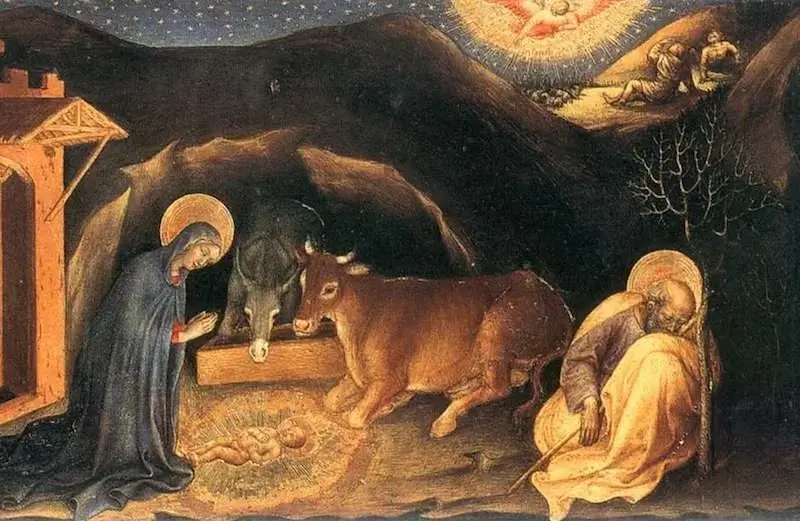
She had arranged some straw and hay upon a stone in order to prepare for the God-Man his first resting-place upon earth next to that which He had found in her arms. According to divine ordainment an ox from the neighboring fields ran up in great haste and, entering the cave, joined the beast of burden brought by the Queen. The blessed Mother commanded them, with what show of reverence was possible to them to acknowledge and adore their Creator. The humble animals obeyed their Mistress and prostrated themselves before the Child, warming Him with their breath and rendering Him the service refused by men.
And thus the God made man was placed between two animals, wrapped in swaddling-clothes and wonderfully fulfilling the prophecy, that:
The ox knows its owner, and the donkey its master’s crib; but Israel does not know, my people do not understand. (Isaiah 1:3)
THE INSTRUCTION GIVEN BY THE QUEEN OF HEAVEN
My daughter, if men would keep their heart disengaged and if they would rightly and worthily consider this great sacrament of the kindness of the Most High towards men, it would be a powerful means of conducting them in the pathway of life and subjecting them to the love of their Creator and Redeemer. For as men are capable of reasoning, if they would only make use of their freedom to treat this sacrament with the reverence due to its greatness, who would be so hardened as not to be moved to tenderness at the sight of their God become man, humiliated in poverty, despised, unknown, entering the world in a cave, lying in a manger surrounded by brute animals, protected only by a poverty-stricken Mother, and cast off by the foolish arrogance of the world?
Who will dare to love the vanity and pride, which was openly abhorred and condemned by the Creator of heaven and earth in his conduct? No one can despise the humility, poverty and indigence, which the Lord loved and chose for Himself as the very means of teaching the way of eternal life. Few there are, who stop to consider this truth and example: and on account of this vile ingratitude only the few will reap the fruit of these great sacraments.
But if the condescension of my most holy Son was so great as to bestow so liberally upon thee his light and knowledge concerning these vast blessings, ponder well how much thou art bound to co-operate with this light. In order that thou mayest correspond to this obligation, I remind and exhort thee to forget all that is of earth and lose it out of thy sight; that thou seek nothing, or engage thyself with nothing except what can help thee to withdraw and detach thee from the world and its inhabitants; so that, with a heart freed from all terrestrial affection, thou dispose thyself to celebrate in it the mysteries of the poverty, humility and divine love of the incarnate God.
Learn from my example the reverence, fear and respect, with which thou must treat Him, remembering how I acted, when I held Him in my arms ; follow my example, whenever thou receivest Him in thy heart in the venerable sacrament of the holy Eucharist, wherein is contained the same God-Man, who was born of my womb. In this holy Sacrament thou receivest Him and possessest Him just as really, and He remains in thee just as actually, as I possessed Him and conversed with Him, although in another manner.
I desire that thou go even to extremes in this holy reverence and fear ; and I wish that thou take notice and be convinced, that in entering into thy heart in the holy Sacrament, thy God exhorts thee in the same words, which thou hast recorded as spoken to me : become like unto Me. His coming down from heaven onto the earth, his being born in humility and poverty, his living and dying in it, giving such rare example of the contempt of the world and its deceits; the knowledge, which thou hast received concerning his conduct and which thou hast penetrated so deeply by divine intelligence : all these things should be for thee like living voices, which thou must heed and inscribe into the interior of thy heart.
These privileges have all been granted to thee in order that thou discreetly use the common blessings to their fullest extent, and in order that thou mayest understand, how thankful thou must be to my most holy Son and Lord, and how thou shouldst strive to make as great a return for his goodness, as if He had come from heaven to redeem thee alone and as if He had instituted all his wonders and doctrines in the holy Church for none else than thee (Gal. 7, 20).
Wonderful, my daughter, was the gift of humility, which the Most High conferred upon me in the event described by thee. And since his Majesty does not reject the prayers of those, that dispose themselves to receive it, I desire that thou imitate me and be my companion in the exercise of this virtue. I had no part in the sin of Adam, for I was exempted from his disobedience; but
because I partook of his nature and by it was his daughter, I humiliated myself in my estimation to nothingness.
In the light of this example then, how far must those humiliate themselves, who not only have had a part in the first sin, but also have committed other sins without number? The aim and motive of this humiliation more over, should not be to remove the punishments of those sins, but to make restoration and recompense for the diminution and loss of honor, which was thereby occasioned to the Creator and Lord.
If a brother of thine should grievously offend thy natural father, thou wouldst not be a loving and loyal daughter of thy father, nor a true sister to thy brother, if thou wouldst not grieve for the offense and weep not over his ruin as over thy own ; for to the father is due reverence and to thy brother thou owest love as to thyself.
Consider then, dearest, and examine in the proper light, how much difference there is between thy Father who is in heaven and thy natural father, and how all of you are his children, bound together by the strictest obligation of brethren and of servants of one true Master. Just as thou wouldst shed tears of humiliation and confusion at some ignominious fault of thy natural brother; so I wish that thou do it for the sins, which the mortals commit against God, sorrowing for them in confusion as if thou wert responsible for them thyself.
That is what I did at the thought of the disobedience of Adam and Eve and of all the evils, which ensued therefrom to the human race. And the Most High was pleased with my charitable interest ; for most agreeable in his sight are the tears shed for the sins, which are forgotten by those, that have committed them.
At the same time see thou bear ever in mind, that, no matter how great and rare are the favors received from the Most High, thou do not despise the danger of sin nor contemn the solicitous and humble performance of the ordinary duties of precept and charity. For these do not oblige thee to leave the presence of God: faith teaches thee, and inspiration should govern thee, to bear Him with thee in all occupations and places, quitting thyself and thy inclinations, but fulfilling in all things the will of thy Lord and Spouse.
Do not allow thyself to be led in these sentiments by the trend of thy own inclinations, nor by that which seems to agree with thy own interior liking and taste; for many times the greatest danger is hidden beneath this cloak. In such doubts and hesitations let holy obedience be thy umpire and master ; through it thou canst decide securely, and thou wilt need no other criterion for thy actions. Great victories and advances in merit are connected with the true submission of self and subjection of our own judgments to those of others. Thou shouldst never wish to retain for thyself the power to will or not to will : then thou shalt sing of victories and overcome thy enemies.
My daughter, I wish that thou be very cautious and watchful in regard to the ignorance and darkness, by which the demon commonly ensnares mortals and makes them forget their eternal salvation and the continual danger of its loss through his persecutions. Men are lost in forgetful rest and sleep, as if there were no vigilant and powerful enemies. This dreadful carelessness arises from two causes: on the one hand men are so taken up with their earthly and sensible being (I Cor. 2, 14), that they do not feel any other evils except those concerning the animal nature in them; all that is interior is harmless in their estimation. On the other hand, since the princes of darkness are invisible and unperceived by any of the senses (Ephes. 6, 12) and since carnal men neither touch, nor feel, nor see them, they forget the fear of them. Yet for this very reason they ought to be more attentive and careful, since invisible enemies are more cunning and adroit in injuring us by their treachery. So much the more certain is the danger, the more concealed it is, and so much the more deadly are the wounds, the less they are felt and recognized.
Listen, my daughter, to most important truths concerning eternal life. Attend to my counsels, follow my instructions and receive my warnings; for if thou pass them by unheeded, I will cease to speak to thee. Hear what thou hast not until now known of the disposition of these enemies. I wish to make known to thee that no intellect, nor any tongue of man or angels can describe the wrath and fury which Lucifer and his demons entertain against mortals just because they are images of God and because they are capable of enjoying Him for all eternity. The Lord alone can comprehend the wicked malice of these proud and rebellious spirits against his holy name and against his worship. If these foes were not restrained by his almighty arm they would in one moment destroy the world; they would like famishing lions, like wild beasts and fierce dragons, despatch all mankind and tear them to pieces. Now however the most kind Father of all mercies wards off and curbs their wrath and He bears his little children in his arms in order that they may not fall a prey to these hellish wolves.
Consider then, as seriously as thou canst, whether anything deserves greater pity, than to see so many men misled into danger and made forgetful of it; how some of them cast themselves into it on account of their lightheartedness, some of them for trivial reasons, others for a short and instantaneous pleasure, others through negligence, and yet others on account of their inordinate appetites, tearing themselves away from the places of refuge, in which the Almighty has placed them, to fall into the hands of such cruel and furious enemies ; and not only to feel their fury for an hour, a day, a month, or a year, but to suffer indescribable and unmeasured torments for all eternity.
Thou shouldst be rilled with fear and wonder, my daughter, to see such horrible and dreadful foolishness among the impenitent mortals and to see even the faithful, who have come to know and confess all this by faith, so far lose their understanding and allow themselves to be so insanely blinded by the devil that they neither regard nor avoid this danger.
In order that thou mayest fear it and preserve thyself the better, remember that this dragon knows thee and lurks about thee ever since the hour of thy creation and entrance into this world. Night and day he reslessly prowls about seeking some chance of capturing thee as a prize. He observes thy natural inclinations and also the gifts of the Lord, in order to combat thee with thy own weapons. He charges other demons with thy ruin and promises reward to those that are more diligent in securing it. They weigh thy actions carefully, watch thy footsteps, and work zealously to lay snares for thee in all thy undertakings. I desire thee to meditate on these truths in the Lord, who will show thee whither they lead; compare them afterwards with thy own experience and thou wilt understand, whether thou hast any occasion for sleep in the midst for such dangers.
Although this watchfulness is important for all the woman-born, it is more necessary to thee than to others for especial reasons : and if I do not mention them all to thee now, do not doubt, that thou must live with great vigilance and caution. It suffices to remind thee of thy soft and yielding nature, which thy enemies will strive to make use of for thy destruction.
wisdom was hidden in things from the foundation of the world
Become Part of Catholic Principle to Further Your Knowledge.



